这篇文章转载自AnimeNewsNetwork的the Mike Toole show栏目,我一直很喜欢这个栏目的作者Mike Toole的文章(虽然都是面向北美的观众),因为他评论的基本上是我们这个时代之前的动画,特别是他将现在的动画和以前的动画相比较时,你会有有种莫名的沧桑感受,这非常有意思(这篇文章会涉及两个他所做的评论视频,你可以借此快速感受一下)。 然而我很惊讶地发现,他今年的专题中居然有一篇居然是关于键社作品的改编动画,而这篇文章仅仅只是讨论了三部作品——京阿尼改编的《Air》,《Kanon》和《Clannad》,这是很少见的。我对此很感兴趣,也顺便把它全文翻译了。
我记得这三部动画中,给我留下最深刻印象的是《Kanon》,因为我看《Kanon》时哭得最凶狠。但是这位Mike Toole先生跟我们欣赏方式不同(或者说不善于欣赏?),你会在下面的文章中看到,他对这些作品微词不少,起码有很多地方我是不同意的,但同时这意味着他也比我们跟看的清它们的优点在哪儿。简而言之,你不需要认同他的观点,但是换一种像他那样的(批判?冷静?)的思维再来回顾这些作品,你会觉得很有意思的。
为了防止译文出现误导人的情况,下面的文章将以原文+译文的方式呈现,排版方式将依照原文。
标题:The Mike Toole Show: Moe is the Key(萌的同义词是键)by Michael Toole, Feb 10th 2013
http://www.animenewsnetwork.com/the-mike-toole-show/2013-02-10 I kinda have a reputation for being down on moe anime and manga. It's certainly not undeserved, either-- in the past, I've put moe anime under the microscope for my ill-fated video segment, and published some helpful instructions from my wife on the best way to enjoy Happy Lesson. When flimsy cutie-pie garbage heaps like DearS and NAKAIMO hit the airwaves with a resounding thud, I just about break the goddamned sound barrier in my rush to condemn them as facile crap that brings the whole medium down.
要说“黑”萌系动画和漫画,我是有点点名气的。当然,这可不是在冤枉——我曾在我那历经周折的
视频中剖析过萌系动画,我还曾把我内人原创的教程“
享受《HAPPY★LESSON》乐趣的最好方法”都公布了出来。当像《DearS》和《三人行必有我妹》这样的废萌作都在收视上获取了巨大的成功时,我恨不得立马突破那该死的音障冲过去把这些肤浅的节目断罪为整个行业的败类。
But you know what? I've got nothing at all against moe as a genre element. Toradora! and Azumanga Daioh are big favorites of mine, I've watched and enjoyed fare like K-ON! and Lucky Star, and I feel a keen, genuine sense of big-brother protectiveness when the protagonist gets in a heap of trouble in Kaiji. (Yeah, I say Kaiji is moe. You gonna prove me wrong?!) The Kyoto Animation hit parade, in particular, pumps out moe faves like Haruhi Suzumiya with almost military precision and regularity-- and amongst the genre's biggest fans, few titles are more widely-known and well-liked than KyoAni's collaborations with video game/visual novel developer Key/Visual Art's. Let's put their holy trinity of hits-- Air, Kanon, and Clannad-- under the microscope.
然而你可否知道,我完全不反对“萌”作为动画的一要素来表现。《龙与虎》和《阿兹漫画大王》可是我的大爱,我也很欣赏一些作品像《轻音》和《幸运星》,而且当我看到《逆境无頼カイジ》中的主人公陷入一堆麻烦中时,我内心由衷产生了一股强烈的作为兄长的保护欲(我说《カイジ》很萌,你说我有错?)特别是在京都动画的节目单里,总会冒出以近乎军人般的态度推出的萌系大作如《凉宫春日》(系列)。而且对于“萌”类型作品的绝对粉丝,没有比京阿尼和视觉小说工作室Key/Visual Art's的合作作品的名字更为响亮了。那么,让我们对萌系大作中这“三位一体”一般的存在——《Air》,《Kanon》,《Clannad》来一探究竟吧。

Like I mentioned above, I'd already had a look at Kanon, KyoAni's 2006 adaptation of Key's 1999 breakout hit. But I was really only looking at the first five episodes, and while I've always maintained that a genuinely good series needs to be good right from the beginning, maybe I was being a little unfair to the show. A lot of of the moe stuff I've raked over the coals in the past-- poop like Sister Princess and Hanaukyo Maid Team-- haven't really stood the test of time, but Kanon has steadfastly remained in print, and its fandom is active and sometimes produces pretty wonderful shit. Air, which came afterwards in game form but was the first collaboration between Key and Kyoto Animation, seems nearly as resilient, and then there's Clannad.
正如上面所提到的,我对2006年京阿尼由键社1999年的大卖之作改编而来的动画版《Kanon》已有浅尝,不过真正意义上,我只是认真看了前五话,而且我一直主张一部好片子总要有好的开头,所以对这部作品的评价我可能略失公允。我曾“黑”过的很多萌系作品——如《妹妹公主》和《花右京女侍队》这样的渣作——都未禁得起时间的考验,然而《Kanon》却青春常驻,粉丝活跃,而且这些粉丝有时还创作出“
很棒的家伙”。其后的游戏版《Air》的改编是键社和京阿尼的第一次合作,这次的相性看起来还好,然后就是《Clannad》的问世。
I'll resist the urge to make dumb jokes about Celtic synthpop/folk bands involving Enya, but only because I don't know that much about the subject. Clannad stands slightly apart from its predecessors for a few reasons-- in visual novel form, it was the first Key title that didn't involve some smutty love scenes as a selling point, and in anime form, its two 22-episode seasons (plus OVA goodies) make it twice as long as Kanon and four times as long as Air. Finally-- and here's what spurred me on to write this column-- its second course, Clannad After Story, spent a good few years sitting atop the ANNcyclopedia Best Rated chart. The people who love Clannad love it a ton, and even if I don't burn with moe passion for it after a full viewing, at least I might be able to understand their devotion a little better. Clannad After Story is still hanging tough in the #2 slot, too-- only the red-hot Steins;Gate has managed to displace it.
我会克制不去开那个恩雅所在的凯尔特民俗音乐乐队的玩笑,那只是因为我对这个话题不熟悉罢了。《Clannad》在以下几点不同于那两部前作——它是键社的第一部不卖一些成人镜头的视觉小说,而它的动画版以每季22集出了两季(加上OVA),这是《Kanon》的两倍,《Air》的四倍,最后一点是,《Clannad》的第二部分AfterStory在ANNcyclopedia排行榜的第一位宝座上稳居好几年,这就是我不得不写这个专题的原因。Clannad的粉丝对这部作品的爱是不可小视的,即便我不去“燃烧着对萌的热情”把全剧看完,至少我还是能够体会那些人的心情的。《Clannad AS》依然很顽强地坐在排行榜第二位,只有红得发紫的《命运石之门》成功地把它从首位上拉了下来。
(注:外国有个乐队也叫Clannad,这对大家来说应该是个老梗了吧)
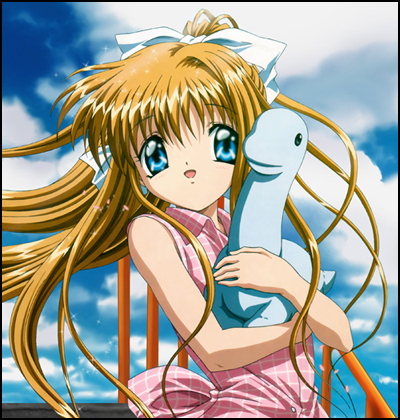
But I gotta start at the beginning of Key and KyoAni's partnership, and that's marked by 2004's Air TV series. Air's been hanging around the North American scene for more than five years now, but for ages I stayed away from it-- its cover made it look harem-ish, but I think it really boils right down to the original character designs, by Itaru Hinoue. He favors narrow faces, huge eyes, and flowing, hyper-detailed hair. It's funny, his character design work was hailed by Japanese fans as quite modern when Kanon hit PC game shelves in 1999, but to me his stuff looks rooted in the mid-1990s, and not in a particularly flattering way. All subsequent Key/KyoAni works would be based on his character designs, and all are directed by Tatsuya Ishihara, a veteran of Studio Pierrot whose experience with family comedy and melodrama anime makes him a good fit for the material.
但是我必须从键社和京阿尼开始合作谈起,而这个标志就是2004年的TV版《Air》。《Air》在北美的屏幕前已经晃荡了5年以上了,但是这么久以来,我一直对它敬而远之——看它的封面,会觉得像是后宫片,但是归根结底,原因在原作中由樋上いたる负责的人设。 他的设计偏好窄脸,大眼,飘动的细节丰富的头发。有趣的是,当1999年《Kanon》上架引起轰动之后,这样的人设被日本的粉丝们奉为风尚。但就我看来他的设计源自90年代中期的风格,而且没有特意迎合受众的感觉。所有之后京阿尼制作的由键社作品改编而来的动画都是基于在他的人设风格,都是由Studio Pierrot的一位老将,石原立也担当总监督。石原那监督家庭喜剧和煽情片(melodrama)的丰富经验让他成为改编键社作品的不二人选。
So Air is the story of a telekinetic homeless guy and the women in his life. Alright, protagonist Yukito Kusinaki isn't a vagrant, precisely, but he is a wandering puppeteer who's been drifting from town to town, trying to make sense of his late mother's obsession with an obscure legend about winged people and a girl in the sky. He's waylaid on the seawall by Misuzu, an oddly childlike teen girl who plays with him and insists on dragging him home to Haruko, her aunt and legal guardian. Haruko isn't thrilled by this turn of events, but she warms up to Yukito after he proves to be a dependable friend to Misuzu and a good listener when Haruko gets drunk and chatty. As Yukito settles in, he meets other girls-- Kano, who believes she has magic powers and starts dropping odd clues about the girl in the sky, and Minagi and Michiru, a pair of buddies with a sad and kinda supernatural secret.
那么,《Air》一个无家可归的念力男和他生命中的女性的故事。好吧,确切的说,主人公国崎往人并不是个流浪汉,但他是一位漂泊的玩偶师,从一个小镇到另一个小镇,为的是完成已故母亲的出自一个关于翼人和空中的少女的无名传说的执念。他遇到了埋伏在海岸线的观铃,这个古怪幼稚的少女不仅要和他一起玩,而且还把他拽回家见晴子,即观铃的小姨兼监护人。晴子并未被这形势转变所吓着,而是随着往人被承认是观铃的可靠伙伴,并且成为晴子她酒话的倾诉对象时,逐渐接受了他。当往人安顿下来后,他有遇见了其他的女孩——相信自已会使用魔法并带来一些关于“空中的少女”的零星线索的佳乃,还有小满和美凪这对伙伴,她们背后也有着一个悲情且有点不可思议的秘密。
So right from the get-go, we've got fabulous secret powers and weird old legends. But Air isn't some kind of crazy mystical fantasy-- its magic stuff is incidental to the story, and pretty low-key. (Ha! See what I did there?!) Yukito's odd powers and sharp, surly, inquisitive nature lead him in and out of Kano and Minagi's lives, but he keeps coming back to Misuzu, who seems to be somehow related to a millennia-old story-- and a curse, which is destined to kill the girl linked to it!
所以从一开始,我们就得知了这个片子涉及神话般的神秘力量和奇怪的古老传说。但是《Air》并不像某些愚蠢而神秘的幻想剧——其中的“魔法”可有可无,并未在故事发展中发挥作用。(哈!明白我的意思吧?!)往人那奇异的力量和敏锐又好事的性格引导着他穿插在佳乃和美凪的生命之中,但是他还是回到了观铃身边,这个女孩不知怎的牵涉着一个跨越千年故事,一个注定会让相关人走上黄泉的诅咒。
It's interesting to me that Air was scripted after Kanon, because the anime version, in so many ways, really does feel like a practice run for the shows that would come later, and not a particularly impressive one either. Ishihara does a good job of evoking the game, with a stylish OP that evokes the much lengthier VN original and use of transitions and music cues that remind the viewer of the original work, but the anime's central characters, conflicts and mythology just aren't satisfying. An extended flashback to the original Heian-era legend is interesting but all too brief, and the final mom-and-daughter-bonding arc just feels forced. The only things I liked about Air were its setting and background scenes, based on the real-life very pretty beach town of Kami, and the way Misuzu constantly, nervously utters the nonsense word “gao.” Yes, it's an affectation designed to make viewers go “d'aww she's so dopey and cute!” but hey, “gao” is what Giant Robo himself says, so I can't fault her for copying him.
让我感兴趣的是,《Air》动画化竟然是在《Kanon》之后,因为《Air》的动画版看起来简直就像为以后改编游戏的一次试水,而且也并没有改编得让人心悦诚服。新式亮丽的OP,过渡形式和音乐的采用,石原借此成功地让动画版向原作游戏回归。然而动画中的核心角色,矛盾冲突和对翼人传说的描写都不那么尽人意。对平安时代的传说的回溯很有趣但太过简短,而结局的“母女相认”让人感到牵强。《Air》让我喜欢上的仅仅是它的背景,它在现实中有着原型地——一座美丽的海岸小镇香美町,还有就是观铃经常兴奋地发出的怪叫“嘎哦”。对,这是特意让观众产生这样的想法“哇!这家伙真是笨拙而可爱”,不过“嘎哦”可是“铁甲人”(《GiantRobo》)发出的声音啊,(为了那份可爱)我可无法非难她的模仿。
But for all its flaws, Air, in its original visual novel form, sold 300,000 copies across all platforms. Ten years ago, Japan's PC game scene was small and insular (as opposed to now, where it's somewhat larger and insular), so this is damn impressive. Kanon and Clannad are also bigtime PC games in Japan, which fascinates me. They're not technologically impressive, and technically speaking, they only barely qualify as games-- they're kinda like graphical versions of those old Choose Your Own Adventure books, only instead of escaping from aliens trying to turn you into food, you're a lonely dude in a small town, trying to get your life sorted out and maybe court the girl of your dreams. When I think of top-tier PC games around the year 2000, my mind goes to Half-Life and Planescape: Torment, and not Kanon.
尽管有瑕疵,视觉小说《Air》在各平台共卖掉了30万份。在10年前,日本的PC游戏生态小而封闭(与此相反,如今是大而封闭),所以这个数字是相当令人钦佩的。让我的惊奇的是,在日本,《Kanon》和《Clannad》也同是一流的PC游戏。就游戏性而言,它们没什么大不了的,而且技术上来说它们很难被归类为游戏——它们有点类似“Choose Your Own Adventure”类型书籍的图画版。与传统的成为“为了不变成外星人美餐的大逃亡”之类的主角不同,你变成了一个小镇里的单身汉,想尽办法维持生活,可能的话还能赢得梦中情人的芳心。我能想到的2000年前后的顶尖级游戏,是《半条命》和《异域镇魂曲》,而不是《Kanon》。
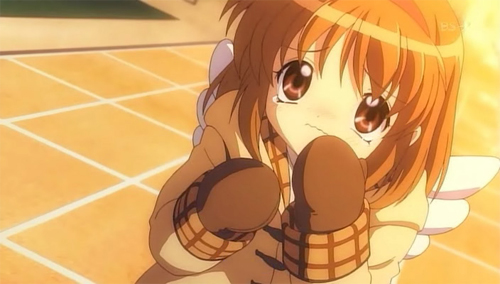
But Kanon was Key's breakout hit, so it's only natural that it would follow Air and be made into a TV series by KyoAni in 2006. Returning was the same team of director Ishihara and scribe Fumihiko Shimo, a versatile writer who's written tons of scripts for shows like Raijin-Oh, Hamtaro, and Gravion. But this time the series received double the episode count-- a sensible decision, as there are a lot more storylines and potential girlfriends to go around.
Kanon是键社的大卖之作,所以很自然会接着《Air》于2006年被京阿尼改编成TV动画。石原监督的团队也借此回归,除此之外还有志茂文彦,这位多才多艺的作家曾为大量动画写过剧本,如《绝対无敌ライジンオー》,《哈姆太郎》和《超重神GRAVION》。但是这回剧集量翻了一番——明智的决策,因为故事线和需要发展关系的潜力女性角色比起前多多了。
Yuichi Aizawa's parents are out of the country (yep, that old plot again) so he's heading to the frigid north to stay with his Aunt Akiko and cousin Nayuki. He'd spent a significant amount of time visiting these relatives of his seven years ago, but he's not thrilled to be going to a snowy town in the dead of winter, and is troubled by weird gaps in his memories of seven years past.
The parade of cute girls starts immediately upon his arrival, when he meets up with mysterious childhood friend Nayuki. Later, he'll encounter mysterious sick girl Shiori, mysterious sword girl Mai, mysterious prank girl Makoto, and mysterious speech tic girl Ayu. You know Ayu's gonna be pretty important, because she's featured most prominently on the cover, she's searching for something that she can't quite remember (let me guess: her car keys?), and she has odd mannerisms, like her tendency to use the masculine “boku” to refer to herself. She also says “uguu” constantly, which is annoying but also somehow hilarious.
由于两亲身在国外(对,又是那狗血的情节),相泽祐一只好投奔住在寒冷北方的亲戚——秋子阿姨和表妹名雪。七年前,他与这些亲戚相处过相当长的一段时间,然而严冬中来到这个被雪所覆盖的城镇的他,心中充满的不是兴奋,而是对自己七年前记忆空白的困惑。
祐一一只脚才迈进这个雪境并会合了神秘的儿时伙伴名雪后,可爱的少女们便立即纷纷登场了——之后他遇见了神秘的病少女栞,神秘的使剑少女舞,神秘的顽皮少女真琴,神秘的口头禅少女亚由。亚由一定会是个很重要的角色,因为封面上最醒目的就是她。亚由在寻找着什么她记不太清的东西(让我想想:难道是她车钥匙?),而且她还有些怪癖,例如癖好使用男性第一人称“僕”来称呼自己。“呜咕~”是她口头禅,这虽然烦人但是也有点搞笑。
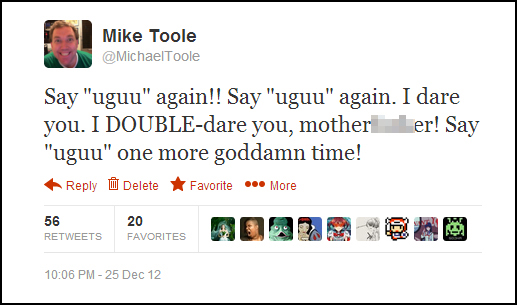
Visually, Kanon is pretty neat. Air was occasionally impressive to look at; Kanon usually is, with more refined and always on-model character designs, and at least a few really tasty animation cuts per episode. There's one bit of action in episode 14, in which a pretty girl trashes a construction site, that would look good in any high-budget action anime. It also boasts a drastically different vibe to its predecessor-- Air was all about shimmery, summery days, but Kanon is the quintessential “sad girl in the snow” anime. In the magical world of Kanon, it's seemingly always snowing, but nobody wears hats. Gloves? Yes. Scares? Sure. But not hats, no sir. Maybe that's why the girls in the snow are so sad-- hey, someone give ‘em a toque!
从视觉感受上来看,《Kanon》是很棒的,《Air》偶尔有令人印象深刻的地方。《Kanon》总体上是得到了精细地制作,人设也一直维持一致规范,并且每话都有一些值得一看的片段。比如,14话有一段少女破坏建筑工地的动作镜头,把这个片段放在任何一部高预算动作类型的动画中都不会显得突兀。另外,《Kanon》所包含的意境也是与前作不同的——《Air》完全是沐浴在夏日的微光之中,而《Kanon》蔓延的则是典型的“雪之少女”的悲伤。在《Kanon》那个魔法般的世界中,雪似乎永远不会停,但是人们都不戴帽子。不戴手套?嗯。不戴围巾?的确。但不戴帽子怎么能行。也许这就是为什么“雪之少女”显得那么悲伤了——得有人给她们各递上一顶女帽才是啊。
Kanon also handles its melodrama decently, and that's a good thing because there's a ton of melodrama in this show. There are seemingly no happy nuclear families in Kanon-- everyone's got dead, imperiled, or simply absent parents or family members. Some of these stories are fairly compelling, but I dislike the way that seemingly every major character has a huge personal tragedy that they're not handling very well. In particular, we've got Shiori, a chipper girl with a mysterious-- and possibly terminal!-- illness that keeps her out of school, but still leaves her healthy enough to wander around the school courtyard, chat ingratiatingly with Yuichi, and eat plenty of ice cream. Actually, I'm down with the ice cream, being from a city where we're known for eating ice cream like crazy in the winter, but Shiori's mystery illness is an all-too-convenient Problem and reliable source of drama. Makoto, a feisty amnesiac who takes up residence at Yuichi's house in the show's first arc, has a mystical background that tragically causes gradual loss of memory, speech, and motor control. You know, magical realism aside, I had a lot more fun just pretending she was succumbing to mad cow disease. How's that for personal tragedy?!
《Kanon》的煽情做的很到位,这可再好不过了,因为煽情部分在《Kanon》中可是占着重要地位。似乎《Kanon》中没有一家人是圆满的——每个角色总有一个或几个家人亲戚要么去世,要么失踪,要么还未脱离危险。有些故事讲起来还蛮通的,可是我并不喜欢看到每个主要角色似乎都有着一个自身难以对待的个人悲剧。特别地,我要提一下栞,她因为患有怪病——可能是不治之症——而无法通学,但是她还是能正常地在校园里转悠,正常地与祐一交谈以吸引他的注意,正常地吃下那么冰激凌。说实话,我可是受够了那些冰激凌,毕竟我所来自的城市里人们在冬天里爱吃冰激凌,甚至以此出名,栞的怪病,无论是作为她所背负的困难,还是作为用来煽情的素材,都实在太不痛不痒了。真琴这个活泼好斗的失忆症患者,在故事开头就与祐一寄居在同一屋檐下。她的背后的故事很不一般,而也是因此而不幸的逐渐失去了现有的记忆,语言和行动能力。尚且不提那些魔法什么的,光是设想真琴是患了症状逐渐加剧的疯牛病就足足让我乐了一回。这又是怎样(催泪)的个人悲剧呢?
In spite of frequent plot conveniences, I found myself warming up to Kanon's snowbound milieu as the series progressed. The background characters are kind of clunky, but the show's charmingly weird romance between Yuichi and Ayu feels real in a way that not too many anime relationships do-- he teases her constantly, but while she bristles at his playful jabs, she plainly loves the attention and enjoys his company. This is also where Kanon's mood and setting are most effective-- being out in the gently falling snow with someone special can be bracingly romantic. Before the whole thing ends, we're also treated to an unintentionally hilarious car accident, numerous tiny miracles that help out just about every character with a sad problem, and a brief look at post-coma recovery that makes Steven Seagal's wakeup in Hard to Kill seem almost realistic by comparison. With just a slightly better script and fewer excruciating plot conveniences, Kanon could've been great.
尽管那样不痛不痒的剧情还有不少,但是随着故事的发展,我发现我自己还是逐渐喜欢上了《Kanon》那个雪所怀抱的氛围。虽然背景角色有点臃肿,但《Kanon》中祐一和亚由之间那动人心弦的微妙浪漫给人的感觉是在很多其它作品中很难感受到的——祐一经常会取笑亚由,但当她嘟起嘴的同时,又会坦率地表示自己喜欢祐一的陪伴和对自己的注视。在纷飞的雪花中与自己重要的人在一起,这样如此浪漫的效果也得归功于《Kanon》对气氛的营造。在故事结束以前,我们还会见识到一场无意中令人发笑的车祸,刚好帮助每个角色克服了自己的不幸的一个个小小奇迹,以及比史蒂文·席格在《七年风暴》中的苏醒显得更不真实的一个短短的昏迷症症后康复片段。稍稍改进下剧本,减少磨人的“图方便”(不痛不痒)剧情,《Kanon》本可以做的更好。
(注:
史蒂文·席格在《七年风暴》里饰演的主人公史都姆,正如电影名昏迷了七年)
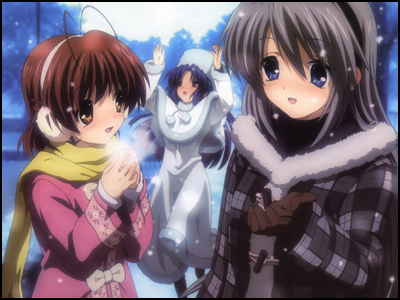
Clannad was Key's first big offering that didn't have any adult content at all-- just a boy and a girl, and their families and pals. In storytelling terms, it's also markedly more ambitious - while the former two keep things rooted in late adolescence, Clannad is a romantic story that isn't just about a boy and a girl, but about filial bonds-- family ties, if you will. (If you're waiting for me to make a joke involving Michael J. Fox, you can keep waiting. This ain't Family Guy!)
《Clannad》是键社第一部不含任何成人内容的大作——仅仅是关于一个男孩和一个女孩,以及他们的家人朋友。就故事构成而言,《Clannad》明显有着更大的野心——当前两作的人物关系建立在最年轻的一辈之上,然而《Clannad》不仅仅只是一个男孩和一个女孩之间的浪漫,而且还有亲情(family ties),如果你愿意这么说的话。(你可别期待着我开个玩笑,把迈克尔·J·福克斯扯进来,这里可不是《恶搞一家》)
(注:迈克尔·J·福克斯是1961年生的美国演员,曾参演过一部叫《家庭的诞生》的电视剧,其英文名就是Family Ties;《恶搞之家/Family Guy》这部福克斯的电视剧以开无厘头的玩笑而出名)
Tomoya has a fairly rotten life. His mom died when he was little, his father turned to drinking and gambling for cheap therapy, and a scuffle after a particularly drunk night left the kid with a nagging injury and a permanent grudge against dad. He's short on friends at school, his teachers are worried he's turning into a delinquent, and he's just sick to death of his town. But all of that starts to change when he bumps into a girl on the way to school - she's older than him but got kept back a year due to illness, and she's just standing there and mumbling about food, trying to psyche herself up to jump back into her schoolwork. Her name is Nagisa. She misses the defunct school drama club, and wants to start it back up. Tomoya's self-esteem is in the shitter and his own dreams are way off in the fog, but he can almost kinda get behind the idea of helping this girl achieve her dream. So he helps her.
朋也的生活相当沉沦。他在儿时母亲去世,父亲一直借酒精和赌博消愁。朋也的父亲在一个醉酒的晚上在儿子身上留下了长久的伤痛,从而造成父子两人间长期的隔阂。朋也在学校没有什么朋友,他的老师也担心他变成个少年犯,而朋也也对他所居住的小镇厌倦到了极点但当朋也在上学路上碰见了一位少女之后一切都发生了改变——她是他的前辈,因为疾病而休学了一年,她当时站在路中喃喃地念叨着食物,让自己打起精神重返学校。她的名字叫渚。她怀念着已废部的话剧部,希望能让它重建。朋也虽然把自尊踩在了脚下,把梦想抛在了身后,但是他却觉得帮助这个女孩实现梦想的主意很不错,所以他和她的故事就这样的开始了。
Fairly promising, right? Yeah, Clannad does a few things pretty nicely-- it gives us a jerky kid in a bad situation and depicts his slow rise out of it, which comes almost entirely because he helps Nagisa with the drama club, giving him both purpose and a social outlet. The show is actually quite good at comedy, depicting one of the gang's school chums as not just a crappy violin player, but the worst violin player in the world, complete with scenery-distorting sonic effects. Each of Tomoya's potential romantic interest starts off with a gimmick like this, but they all have other aspects that come to light as he talks to them more. Fortunately, only one of them is in a coma. Because let's face it, there's always a girlfriend in a coma. Thanks for nothing, Morrissey!
朋也的未来一片光明,对吧?是的,《Clannad》有些情节处理得相当漂亮——这部作品让一个无知的少年陷于困境而描绘他是如何从中脱离,结果这一切都是靠帮助渚建立话剧部完成的,因为这给了朋也目标以及与更多人交往的机会。其实,《Clannad》的喜剧色彩是很浓厚的,将话剧部那伙人中的一位刻画成不是普通糟糕,而是世界上最糟糕的小提琴演奏者——那小提琴声可以让空间扭曲。次次脚本作者都是用这样的鬼把戏让朋也和一个个女孩擦出浪漫的火花,但是每个女孩的故事并不是到此为止,每当朋也与她们的交流更深一步,就能点亮她们世界中的一块新的领域。万幸的是,还好她们之中只有一位是被设定为处于昏迷之中。因为让我们来看看,这些动画中总是会有一位“昏迷的女孩(a girlfriend in a coma)。不知道为什么,我也要谢谢你,莫里西(Morrissey)。
(注:莫里西是生于1959年的英国歌手,看了百科,真的不想介绍他 = =;无论如何,曾经莫里西还在史密斯乐团时创作过一首歌,名字就叫做Girlfriend in a Coma)
But as much as Clannad is funny and occasionally sweet, it's also sometimes a weird road map to unhealthy personal relationships, simply by dint of the fact that everyone is terrified to talk to each other about stuff. Tomoya won't talk to his father about their strained relationship. His friend Okazaki won't mend fences with the school soccer team so he can play again. Transfer student Tomoyo doesn't want to talk about her violent past, and Nagisa doesn't want to talk about the illness that took her out for almost a year-- and that could come back at any time! Yep, everyone's got a problem that just hurts to talk about-- in some ways, Clannad is half a bottle of bourbon and some bad weed away from being a Hold Steady album. By the end of the first series, at which point Tomoya falls hard for Nagisa and tells her so, and she starts crying tears of joy!!, I was left wondering if she wasn't just crying because she was so relieved that one of them finally had the balls to say “hey, I like you” after 20 episodes of awkward moments and sidelong glances.
尽管《Clannad》是那么的有趣,偶尔也让人感到甜蜜,然而它有时也看起来像是一张不健康的人际关系网络图,纯粹是因为每一个人都畏惧别人,并把事情封闭在自己内心这一点。朋也不愿告诉父亲关于他紧张的人际关系;他的朋友春原不愿意与学校的足球队改善关系,而以获取归队的机会;转学生智代也是把自己暴力的过去封闭在心中;而渚也不愿意提到夺去了她一年学园生活的疾病——病魔可是随时都有可能到来啊!不错,每一个人心中都有一块不愿意揭开的伤疤——某种意义上,只差半瓶波旁威士忌和一些大麻,《Clannad》就可以被收入The Hold Steady乐队的专辑了。在第一季的结尾,当朋也终于努力地爱上了渚,并向她告白,而渚则“留下了幸福的泪水”!!这不禁让我这样想:她不只是在哭泣,而是在为她们两人之中,经过了20多话的无数尴尬时刻和对方的目光之后,终于有人有勇气告诉对方“ 喂,我喜欢你”而感到宽慰。
(注:The Hold Steady是2004年组建的一支美国摇滚乐队,其歌曲都包含复杂而伤感的描述,主题囊括毒/酒瘾,宗教和救赎;作者的意思大概是,《Clannad》给人的感觉跟去掉了酗酒,毒品这些内容的The Hold Steady歌曲的很像)
Clannad ends with Tomoya and Nagisa, our star-crossed lovers, becoming a couple. Usually, this is where the story ends. But this story keeps on truckin’ in Clannad After Story (does that mean the first series should be called Clannad During Story?). This is interesting to watch, because the characters actually grow up and get jobs and shit. Tomoya and Nagisa get a crappy apartment, and he starts to work as an electrical lineman. He works eleven hours, and brings the girl some flowers. Her parents, a funny and comfortable couple who plainly and unabashedly like Tomoya, give the youngsters encouragement-- there's a low-key wedding, and of course, a bun in the oven-- but wait! Nagisa's constitution is so weak! She might die!
《Clannad》的最后朋也和渚成为了一对。这对不幸的恋人结为了夫妇。通常一切就这样结束。但是《Clannad》的故事延续到了《Clannad After Story》(那么这就意味着第一季就应该叫做《Clannad During Story》?)这后续会很有意思,因为你可看到角色们都已经长大了,而且找到了工作。朋也和渚住进了个廉价的公寓,丈夫找了一份电工的工作,每天工作11小时,有时候会给妻子带一点鲜花。渚的父母,这愉快有趣的一对,坦率地接受了朋也,并给予这对年轻人以鼓励——帮他们举行了个低调的婚礼,当然会有早苗的面包——等等!渚的身体状况并不好!她会没命的!
I have to hand it to Key's chief scribe, Jun Maeda-- his stories and characters don't always hit target, but he's good at establishing mood, and effectively uses music (often his own compositions, as he does some of the incidental music in these games) to augment it. These adaptations might use different staff, but they're still adapting his dialogue and using the exact same music as the games. There are lots of great little moments in Clannad, like pickup baseball in the sunshine with the neighbors, and Nagisa and Tomoya just chilling out together in their crappy apartment. After Story’s depiction of Nagisa and Tomoya's transition into mundane adulthood is probably the closest thing to actual slice-of-life storytelling that I've seen one of these shows do-- but then it all gets ropey, as Tomoya is once again assailed by tragedy after tragedy. There are entire goddamn episodes of freaking out and crying, and it all gets irritatingly emotionally manipulative. It all seems too messy and harsh, until the ending, when it all seems too neat and tidy. On the whole, I think the series just has a hard time striking a nice balance between its comedy and melodrama.
我还想谈谈键社的剧作家中的第一把手麻枝准——他总喜欢兜着圈子写故事和角色,但是他很擅长营造氛围,并运用音乐进一步渲染气氛(经常用的是他的曲子,因为他也参与了游戏的配乐)。改编的动画本可以使用些新东西,但是制作方还是原封不动地采用游戏中的对话和音乐。《Clannad》中有着许多简短而又美好的时光,比如东拼西凑的棒球赛,渚和朋也刚在他们那廉价的公寓里安顿下来的日子。讲述渚和朋也转变为社会人的After Story是所见过的真正算得上是日常类型(slice of life)的作品,可是不久之后又是那些多见不怪的东西了,朋也又一次被一轮又一轮的不幸冲击着。有几话甚至全是幻觉和泪水,然而这个烂摊子居然全被收拾干净了。这些场面太过粗糙杂乱,而到了结局,一切则恢复了正常(正常过头了)。总而言之,我觉得这部作品在平衡悲与喜之上费了不少功夫。
So why is After Story held in such high esteem, even compared to its related media? I'm not really sure. The show certainly looks great, and Tomoya and Nagisa are a charming and vulnerable pair of leads, but every time things get a little too slow, Maeda hits the “she DRAMATICALLY COLLAPSES” button. Personally, I think the first series is more enjoyable on the whole-- I dug watching Tomoya turn into an adult with responsibilities in After Story, but the original's larger cast of characters and greater variety of stories are just more interesting.
那么为什么《After Story》获得了这么高的评价,甚至比过了它的本篇?我真的不太清楚。这部作品确实能让人大饱眼福,而且朋也和渚也是美而易碎的一对典型,但是每当剧情发展得太慢的时候,麻枝准就按下“女主角崩溃”按钮。我个人看来,第一季总体上来说让人看得更尽兴——我并不讨厌看到朋也在《After Story》中成长为一个要负责任的大人,只是更丰富的角色和故事会更有趣。
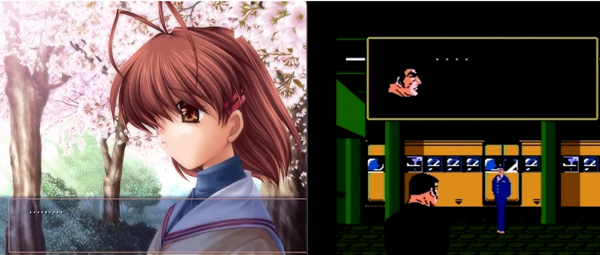
After absorbing 87 episodes of winsome girls in a variety of seasons with oddly humongous eyes, what do I take away from all this? Well, I still like some moe anime, and I feel like I have a better handle on why people like these shows so much. Clannad didn't blow me away and Air barely even stuck around in my short-term memory, but even with its issues, Kanon does a good job of selling me on why shows like these can bring up such ardor in fans. Air and Kanon and Clannad aren't for the cynical, or for deep thinkers looking for complicated, challenging themes. They're for saps! They're for people who kinda sorta believe in love at first sight, and running along the train platform to wave goodbye to your best girl, and the red string of fate that binds lovers together. They're for couch potatoes who enjoy dirty movies, but only the tasteful dirty movies, you know, the ones with real stories and romantic stuff like smooching in the rain and gettin’ it on in front of a roaring fireplace. Given the largely male audience for VNs and their anime adaptations like these ones, I'm compelled to compare them to Harlequin romance novels... but for dudes.
在看了87话若干季的长着奇怪的大眼睛的可爱少女之后,我想特别说些什么呢?那个,对于某些萌系动画,我还是会继续喜欢下去,而且我也感觉自己越发能理解那些人对萌系动画的喜爱。《Clannad》并没让我流连忘返,而《Air》甚至基本上没在我的印象里停留多长时间,但是即便存在着很多问题,《Kanon》却成功地让我明白了为什么这些作品能掀起粉丝们如此大的热情。《Air》,《Kanon》和《Clannad》不适合犬儒主义观众,或是渴求深度,复杂而富有挑战性主题的思考者。它们只适合一般人——那些第一眼就相信爱情的人,适合那些追着开动了的女友所坐火车奔跑着挥舞着手说再见的傻瓜们,适合那些相信命运中的红线的那些人,适合那些成天坐在沙发上的酷爱“毛片”的胖宅,而且这些“毛片”不是一般的“毛片”,对于他们来说一定要“够味”——要建立在真实的故事之上,要够浪漫,比如要有雨中的接吻,呼啸的火灾现场的激情这些镜头。考虑到这些视觉小说和由其改编的动画面向的大部分是男性观众,我不由得觉得它们跟Halequin出版的爱情小说很相似,只不过那是给男人们看的。
(注:Harlequin指的是Harlequin Enterprises Limited,是加拿大的一家专门出版女性向书籍的出版机构)
(吐槽,我写了这几个注解之后,真心觉得看这篇文章像是在推rewrite)
Ultimately, the answer to what I'm gonna take away from this experience is Kanon. I'll pass the Air and Clannad discs on to more devoted fans, but I'm gonna hang on to Kanon for now. After all, I might wanna hear that girl say “uguu” one more time. I guess that means that my earlier video evaluation of the series was off the mark, but I'm not gonna worry about that. I'm wrong about stuff all the time! One last thought: I did not forget to mention the Air and Clannad movies or the 2002 Kanon TV show. Those are made by Toei, not Kyoto Animation, so they're outside the scope of this already hilariously long column. I also did not forget to mention Little Busters!, because that's J.C. Staff, not KyoAni. We cool? We cool.
最后,有了这样的观影经历之后,我想特别提出来的是《Kanon》。我只会将《Air》和《Clannad》推荐给那些忠心耿耿的粉丝,但是对于《Kanon》,从现在我会一直关注下去,也许我是想再一次听到亚由的“呜咕”。我想这意味着我之前在那个视频中对《Kanon》的评价并不恰当,但是我对此我并不感到在意,因为我哪一次都没说对!最后说一句:我并没忘记的《Air》和《Clannad》剧场版,以及《Kanon》2002年版的TV动画,它们都是由东映制作,而不是京都,所以它们没有划入这个已经足够欢乐冗长的专题中。我也没忘记《Little Busters!》,因为是J.C.Staff,不是京都。
How about you, gang? Do you like any of Key/Kyoto Animation's shows? Do they fill you with romantic feelings, or just outrage at the dumb characters doing dumb things? Were you as confused as I was at the girls’ school uniforms in Kanon, with their Santa color scheme and weird little capelets? Let me know in the comments!
你是怎样认为的呢,伙计?你喜欢京阿尼改编的键社作品的动画吗?它们是让你感到浪漫,还是让你愤慨道这是一群傻角色在做傻事?当你看到《Kanon》中的女生制服,那圣诞老人式的配色方案和奇怪的小型披肩,你会不跟我一样感到困惑?让我来期待你们的评论吧。
=============================================
下面这两个视频是Mike Toole做的两个探讨萌系动画的节目,分别举了两个例子,一个就是Kanon(这就是文中提到的那个视频),另一个则是Galaxy Angel。与之对应也举了两部如今已经绝版了的动画。
The Anime Jump show: Kanon
The ANIME Jump show: Galaxy Angel
很可惜的是这个视频,我们这里看不成,这也是文章中提到的视频
http://www.youtube.com/watch?v=aQKheh_T0ho唉,这个帖子终于写完了。最后祝大家七夕节愉快。